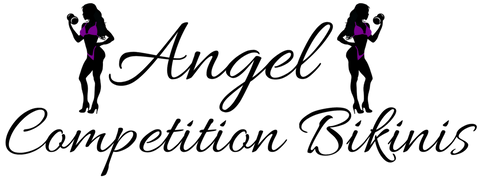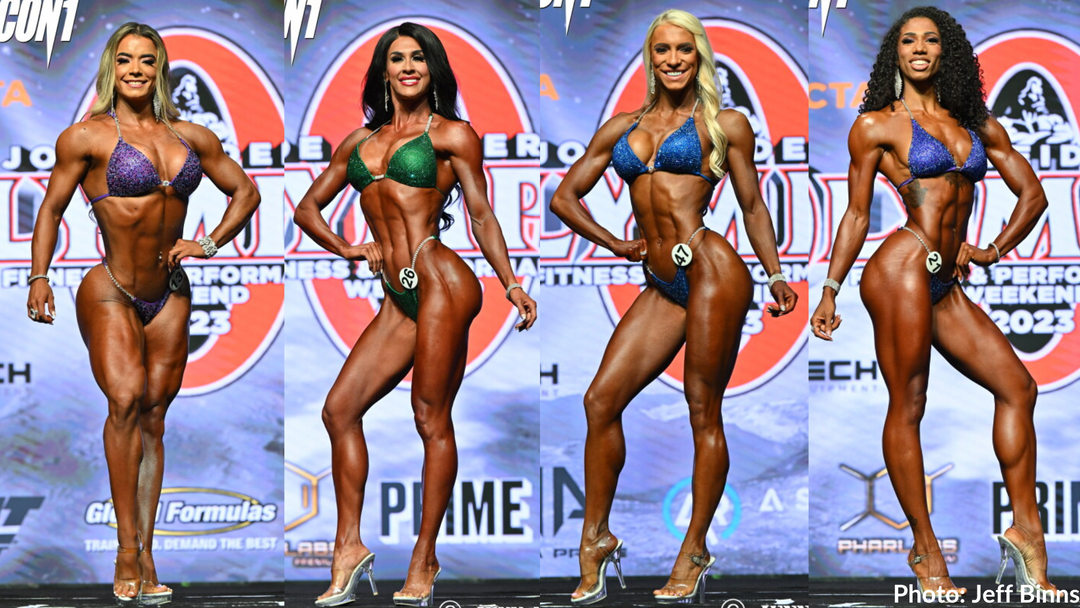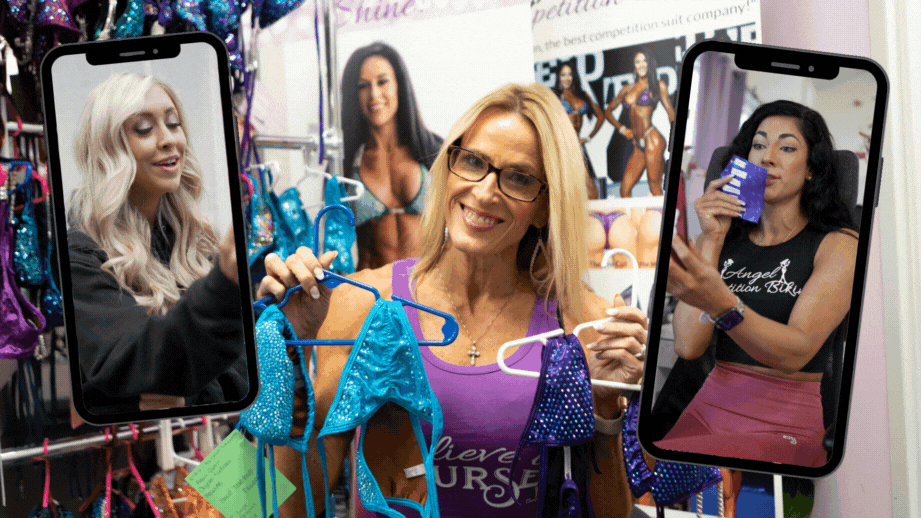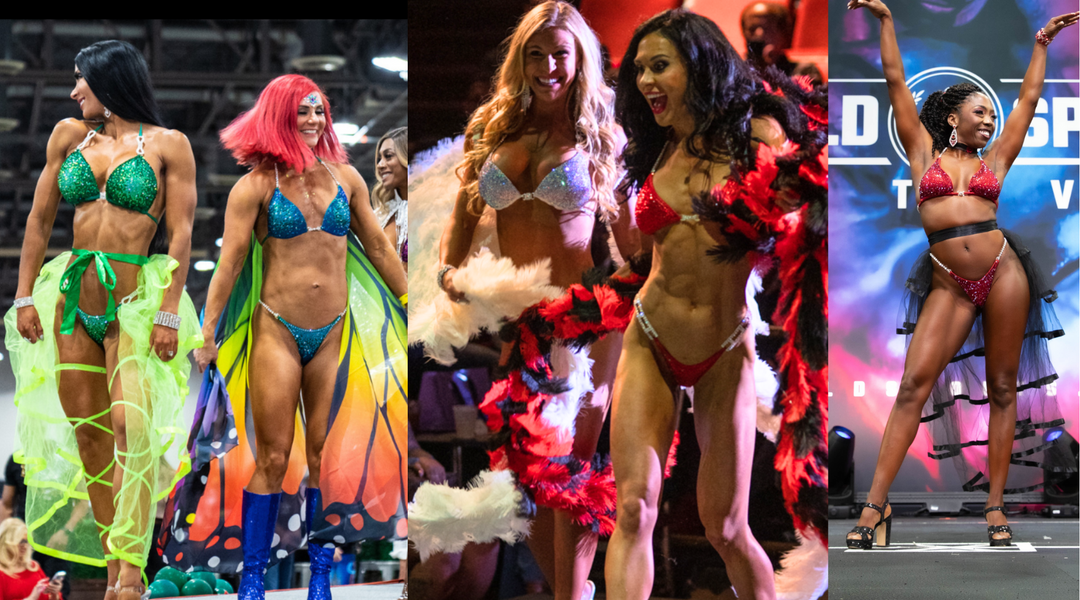Competitor’s Guide To A Healthy Relationship With Food
NPC Bikini Competition Rules, NPC Figure Suits, The Best competition suits are at Angel Competition Bikinis, Angel Beachwear, bikini for women, bikinis for fitness women, NPC Wellness Division, IFBB Competition Suits, beach bikinis
NPC News Online NPC WBFF Fitness and figure competition National Physique Committee Narmin Assria IFBB Bikini Pro International Federation of BodyBuilding, Blog about NPC Bikini, NPC bikini competitor advice
Blog by: Celeste Rains-Turk
In this guide, I am breaking down a few of the key considerations any and every competitor needs to have to maintain a healthy relationship with food while competing because you deserve to have successful preps, productive improvement seasons, and peace of mind year-round. When talking to competitors, I find many of them think they are alone in their struggle and that everyone else is as perfect as their Instagram feed. But the truth is, if this were not a problem, I would not be writing this guide for you. So, I am going to outline the top 3 concerns competitors face and with ways to address them so you can prioritize your relationship with food while pursuing your physique goals. Of course, if you are interested in even more guidance and support, I invite you to join my free food relationship coaching series here

Struggling with your relationship with food at any point in your competition career is distracting, exhausting, and painful. Whether it’s going off plan, overeating, not hitting zeroes on your macros and saying ‘screw it’ the rest of the day, restricting certain foods in fear of losing control around them, fearing food intake, punishing yourself for anything that isn’t perfect, not eating when emotional, eating emotionally, forgoing every social event or food experience in fear of judgement or changing your body or not having willpower…however it looks for you, we can all admit it feels horrible to not act in alignment with your goals and to feel controlled by food. Researchers have determined that competitors who have a greater desire to change their body, even at the expense of their health or with strict and limited diets, are more likely to have uncontrollable urges to eat, participate in purging through laxatives or exercise and food restriction (Goldfield, 2009).

The strongest predictor for disordered eating in elite athletes of aesthetic sports is body image dissatisfaction (Francisco et al, 2013). When you obsess over our body weight, shape, and size to meet standards, you are accepting that fixation on your body will be higher than most people. Athletes who compete in weight related or sports with aesthetic criteria, whether perceived or realized, are more likely to fall into disordered eating (Currie, 2010). Female bodybuilders are at risk for greater body dissatisfaction and unhealthy eating practices because of the low body fat and sometimes weight requirements or the desire for a lean yet muscular physique (Goldfield, 2009). This does not mean you are doomed though. As much as the anti-diet culture or jaded ex-bodybuilders will tell you you cannot have a healthy relationship with food and compete, I am here to tell you, you can. If bodybuilding is a sport that empowers you and adds value to your life, who’s to tell you to stop? Of course, severe cases may require hiatuses or breaks or going back to the drawing board. But if you are in it for the long-haul, does the time and effort really matter?

The key to being an elite athlete in this sport and healing what mentally ails you is intention. People who are more mindful tend to have a higher self-esteem, clearer sense of who they are, and more awareness on how their actions and emotions impact them (Yang, Holden, & Carter, 2017). Your mental health can suffer for many reasons in this sport including but not limited to; restriction, all or nothing mentality, unhelpful positive & negative reinforcements, hyper-focus on body related changes, auto-pilot mode, extrinsic motivation, procrastination or pressing needs, perpetuates unhealthy norms or protocols, comparisons, perceptions, and the ‘should’ mentality. Take all these risk factors and combine them with the other things you are already facing on a day-to-day basis, and you can really be in for a rough ride. Of course, you choose to pursue this sport and the value in choice is beyond measure, but if you forget that you have the choice to change how you pursue this sport and how important your mental health is given the risks, you can be setting yourself up for burn out or mental ailments.

All or Nothing Mentality
The all or nothing mentality is a sneaky cognitive distortion that suggests it is either this way or that way, good or bad, right, or wrong, pro level or amateur. When you tell yourself that something is only great if one way and only terrible another way, you are making it known that you are defined by perfect action. Perfection is a horrible thing to strive for because it is non-existent and has no true meaning. What is perfect to you, or your coach might be sabotage or stupid to someone else. This mindset causes rifts in your relationship with food because it brings morality into your choices, makes you question your judgment, and likely stunts your longevity.
When you are given a set of macros to hit in prep and you are told you must hit them with exact precision while also hitting all your fiber goals you might start to feel restricted or like you failed the moment you were off even slightly. The obsession on eating clean or whole foods can lead to challenges post-show when you may not have or even want full control over every morsel of food that goes into your mouth. This goes for meal plans too, as mentioned earlier, any form of restriction can breed fixation. Making sure your form of restriction is one that you have positive intentions, sustainability, and support behind is key in having more mental peace in your pursuit. Of course, you need to accept that there will be times in this sport where your behavior will not be sustainable or as healthy as the version of you you see yourself as for years to come.
There is a decision that gets made when you become a competitor that you will fixate on details. Much like a business owner might fixate on their ROI or a student might fixate on their grades, it does not mean they are wrong for this, but it does mean they have decided that this really matters to them even if it means sacrificing some of their sanity or life as they know it.

Balancing your life with what it takes to be an athlete is entirely up to you. If you believe being an athlete means you must never have any fun, let go of relationships, give up on other goals and dreams then of course you will feel like balance is impossible. It is not meant to make you feel like you are not living life, and if it does then something needs to change. The real focus needs to be on what out of balance, balance are you prepared to commit to? Finding a way to make your choices feel seamless or effortless is ultimately going to make you feel more balanced because you feel less forced or like you have to hold on tightly to make everything work. Even if your form of consistency looks different than others’, if it gets you where you want and need to be, it still works.
As a competitor though, you must contend with the fact that sometimes you may have to go to extremes and no one who lives to an extreme in any time of their life is in homeostasis. The brain will tell you to eat all the cookies when you haven’t had any, to stop tracking when you have been weighing everything to the gram, to take a break when you have been going for so long. Not because you are weak, but because your body seeks balance. Being able to recognize the nature behind the thoughts can support you in modifying your behavior. When you hear your brain tell you to do this, rather than saying ‘no I cannot do that because then I will fail’, try meeting her where she’s at with ‘I get why you would want me to do that, I have been really pushing myself and it is hard to keep pushing, but this is important to me right now and I intend to return to a place which is more balanced for us after’.
When you tell yourself that you are a horrible competitor, not worthy of going pro, and will never be successful in this sport because you didn’t do something you think you are supposed to do, step back and ask yourself these questions:
Is this approach to prep or improvement season sustainable for years to come? If not, what needs to change?
How do I want to live as a professional athlete? Does this align with my personal vision, needs, lifestyle, and goals?
When did I decide that this was the only way to be successful? If I change that, what would it look like or mean for me?
Post Show
Post-show is always an interesting time for competitors. Most of the times your body is going through a lot of physiological and psychological changes to support finding that place of peace again. Prepping for a show can be a massive stressor, even when it is so enjoyable! It is important to consult with your coach and doctors to make sure you are balanced hormonally and getting the micronutrients you need to function at a high level as you and your body adjust. In consideration for the psychological changes there are some key things that happen. First, your identity of being a competitor on prep and being laser focused on this show date that has now in the past, is now gone. Without a focus beyond your show date, of course you will feel lost. It is important to prepare for the post-show experience before getting there. The last thing you want is for Monday to come around and feel directionless and purposeless. If your actions and focus have only mattered for a show date, there is something missing from your why. I always encourage my clients to think about how this lifestyle serves them beyond meeting a physique goal for their show. When you think about the hours you have spent in the gym, prepping meals, posing, studying the sport…try to also think about how this helps you in other areas of your life that matter to you. Maybe it provides you proof that you can succeed when you set your mind to something, or it has given you a high level of accountability that you now want to apply in your work, or it brought your family closer as everyone spent more time being active and focused together. You might have tons of other reasons, use those to keep driving you post-show! Why is reverse dieting beneficial? Why is it important to keep going to the gym or getting in daily movement? Why does your nutrition really matter to you? After months of these things being positively reinforced with a body changing in the direction you intended it to, of course you will begin to associate these habits with a shrinking body.
As mentioned previously, body image dissatisfaction is a huge predictor of disordered eating along with other mental health concerns. When entering a new season, your body will change! If you are not prepared for that change, it will be more difficult to accept it. So, on prep, be proactive by avoiding positively reinforcing or overly celebrating the scale or measurements dropping. Try to positively reinforce how your actions are supporting you, your health, your mind, and your life! This will help you to carry this mindset with you into the improvement season. Second, binging may be seen as normal post-show, but it really does not have to be your reality. As glamorous as the donut runs and cookies are made out to be, you do not need all of it. I have made the mistake of bringing bags of post-show goodies that I had been stocking up for months. I used to have my mom freeze some of the foods she made that I loved, and I would make plans with people to go out to all these restaurants. This type of behavior reinforces the all or nothing mentality. Rather than focusing on what you will eat post-show with hours of scrolling on Instagram looking at restaurants that are nowhere near you or companies you don’t intend to purchase from, you could be spending time in meditation, relaxation, or feeding your mind and body in other ways. The fixation is a normal response to deprivation, but it does not mean we need to act on these impulses.
When you are faced with the desire to jump into a bag of goodies, it is likely that you and your body don’t actually want them. Practicing mindfulness-based eating during prep can keep you out of autopilot and help you post-show when you feel you have a bit more freedom. Even if you are eating the same thing every day, you can bring mindfulness to those choices. This is especially helpful for when you go out to eat or have a refeed meal or an intuitive day of eating, you will be able to really understand how much you need and are satisfied by as well as what you genuinely want. I want to make it clear as well that switching from a meal plan to macros can help but then you must accept the cost of fixating on every gram of food, micronutrients, and what sits well with you. I personally found I need and benefit from both approaches. I always receive a meal plan and request to have macros with it this way I can make sure the foods on the plan that I buy also help me meet the macros intended to meet and it gives me the freedom to say I prefer this, or I am out of that but need to finish this. This has saved me from the all or nothing mentality, provided me with more longevity, and given me the opportunity to see the benefit of both because rather than feeling like it has to be one way, I am inspired by the knowledge that I get to choose.
When you find the best approach for you, remain open to changes and needs for your success of course, and let the custom plan truly be custom to your life too. When it’s game time though, you have to be ready to perform and do what you gotta do so make sure you like what you are doing even in all its forms! The other thing to keep in mind is that you do not have to celebrate post-show with junk food. I made a blog and Instagram post on this, but it is okay to not celebrate with food after your show. Of course, you need to fuel your body and eat and enjoy your company and see food beyond fuel, but that does not have to be days and weeks or months of gorging yourself. In fact, I would argue if it goes beyond 4 days consistently or it is this off and on perfect then off plan then perfect for a few days and off plan again, then you need to get ahead of it and reach out for help.
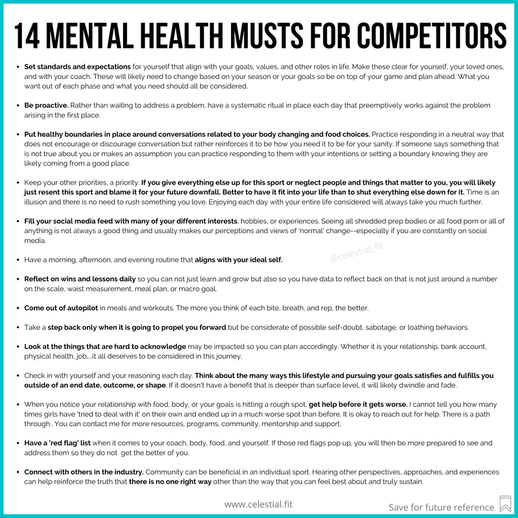
Guilt and Anxiety
Regardless of what season you are in or phase of your competition career, it can be difficult to shake the feeling of guilt and anxiety around food or even other people. Guilt is a psychological phenomenon that describes the feeling you get when you do something you do not consider to be congruent with the way you identify or define yourself. Guilt can be dangerous because I often see it lead to punishment, restriction, or justification patterns that distract from your chances to achieve your goals. For example, if you have been told that any vegetable that is not green is bad and should not be eaten by competitors, and then you have a carrot, you might feel bad about it because you have identified yourself as a competitor and part of that definition of satisfying this identity is to only eat green vegetables. It is worth mentioning too that I often see the issues coaches have in their own relationship with food or distorted/one-sided beliefs about how a process should be completed get handed off to their clients. It is imperative that you discuss the plan with your coach and understand why changes are being made or what they can do for you. This can also support you in your efforts to stay out of autopilot mode!
Of course, guilt is something that can come up with things like how much water you do or do not drink, the cookie you really want to have but don’t really know what a flexible off-season means to you, or even the guilt of turning people down or ordering something different than everyone because some foods just don’t sit well with you yet or at all anymore. Anxiety around food can be the precursor to guilt. Feelings of anxiousness or fear are usually rooted in past experiences or the perceived and known experiences of others. For example, if you see a competitor post about how bad they failed post show and how jaded they are from competing you might be afraid about the same things happening to you. Naturally then, when in similar described circumstances you may get worried or fearful knowing that it could lead to something worse like guilt or shame or needing to quit the sport which is especially scary given how much you have enjoyed it.

Know that many of the mental challenges you face in prep or improvement season are normal responses to circumstances. When a response is abnormal, there is greater cause for concern. With this understanding, we have to start accepting that as effective as the all or nothing mentality can appear to be, it is not helpful to either extent. It is not helpful when competing because it can cause problems after, it is not helpful in trying to ‘fix’ things because it further reinforces that you are only successful at things when you go to extremes, and it is not helpful for any other facet of your life. The all or nothing mentality is comfortable for most of us because we thrive on the structure, but it can also suggest that you cannot compete and have a healthy relationship with food rather than asking why do competitors tend to have an unhealthy relationship with food and their bodies?, what needs to change?, how can we prepare competitors for these changes that will and can occur rather than scare them? In the grand scheme of it all, competing will change how you see yourself, food, and your body. Being in a physique sport changes the way you must view and accept your body as you are also accepting you must commit to certain actions to bring out incredible changes despite how challenging they may be.
Currie A. Sport and eating disorders - understanding and managing the risks. Asian J
Sports Med. 2010 Jun;1(2):63-8. doi: 10.5812/asjsm.34864. PMID: 22375193; PMCID: PMC3289170.
Goldfield GS. (2009). Body image, disordered eating and anabolic steroid use in female bodybuilders.
Eating Disorders, 17(3), 200–210. https://doi-org.ezp.waldenulibrary.org/10.1080/10640260902848485
Yang, C., Holden, S., & Carter, M. (2017). Emerging adults' social media self-presentation and
identity development at college transition: Mindfulness as a moderator. Journal Of Applied Developmental Psychology, 52,
212-221. https://doi.org/10.1016/j.appdev.2017.08.006
Suits for ALL Divisions!
Any of our designs can be made for any division: Bikini, Wellness, Figure & Women's Physique with no up charge based on your division. We have the PERFECT pattern for your next suit, and the most skilled competition suit seamstresses in the world creating it! Scroll to look at examples of some of our favorite suits. Every suit we make starts from scratch which means we can do any combination of colors, styles, and sizes. Let us create your dream Competition Suit!
Click any photo above to shop for your next suit.
Angel Blog
NPC News Online NPC WBFF Fitness and figure competition National Physique Committee Narmin Assria IFBB Bikini Pro International Federation of BodyBuilding, Blog about NPC Bikini, NPC bikini competitor advice
Written By: Best-selling Author of 'Believe your way to Badass', Confessions of a Bikini Pro Podcast Host, Bikini Competitor, and Mindset Mentor, Celeste Rains-Turk specializes in helping women make peace with food, their body and their goals using psychology, personal development, mindfulness, and her signature PTG Process. She has a bachelor’s degree in Psychology and is currently pursuing her M.S Degree in Clinical Mental Health Counseling to support her mission of helping other competitors Build More than Just a Body™.
